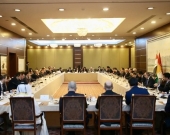Israel approves new East Jerusalem settlement homes

Officials said the construction of 1,500 housing units at Ramat Shlomo was one of four projects given approval.
The Palestinian Authority said the move was "destructive to peace efforts".
It is believed to be an attempt by Prime Minister Benjamin Netanyahu to assuage anger in Israel at the release of the long-term prisoners overnight.
The convicted murderers were freed as part of a US-brokered agreement to resume direct Israeli-Palestinian peace talks after a three-year hiatus.
The men - the second of four groups to be released over nine months - were welcomed by thousands of people in the Gaza Strip and West Bank, including Palestinian Authority President Mahmoud Abbas.
'Worried'
On Wednesday morning, the Israeli interior ministry placed an advert in a Jerusalem newspaper announcing that it was pressing ahead with a project to expand Ramat Shlomo.
The plans, which were approved by the Jerusalem district planning committee in September 2011, include the construction of 1,531 housing units, public buildings and gardens.
The government also approved the development of a tourism and archaeology centre near Jerusalem's sensitive Old City, as well as plans for the establishment of a national park on Mount Scopus in the Hebrew University of Jerusalem campus.
An estimated 200,000 settlers currently live in East Jerusalem, alongside 370,000 Palestinians.
Israel captured East Jerusalem from Jordan in the 1967 Middle East war and formally annexed the area in 1980. Settlements built there and elsewhere in the occupied West Bank are considered illegal under international law, though Israel disputes this.
Israel regards Jerusalem as its eternal and undivided capital. However, Palestinians want East Jerusalem to be the capital of their future state.
Wednesday's announcement is seen as an attempt by Mr Netanyahu to placate right-wing members of his coalition government and many Israelis who have sharply criticised his decision to release 26 prisoners convicted of killing Israelis between 1984 and 1994.
"This is a difficult decision that we have made with a heavy heart," his Defence Minister, Moshe Yaalon, said on Tuesday.
Mr Netanyahu was reportedly persuaded by US Secretary of State John Kerry earlier this year to agree to the prisoner release programme after Mr Abbas agreed not to insist that all settlement construction was halted before he would restart negotiations.
The Palestinian Authority reacted angrily to Wednesday's announcement, but it was not immediately clear if it would have any impact on the talks.
"We are worried and concerned that if Israel continues with the expansion of settlements, this might kill the two states vision which we would like to see on this land," Prime Minister Rami Hamdallah said.
Nabil Abu Rudeina, a spokesman for the president, told the AFP news agency that the move "destroys the peace process and is a message to the international community that Israel is a country that does not respect international law".
BBC












